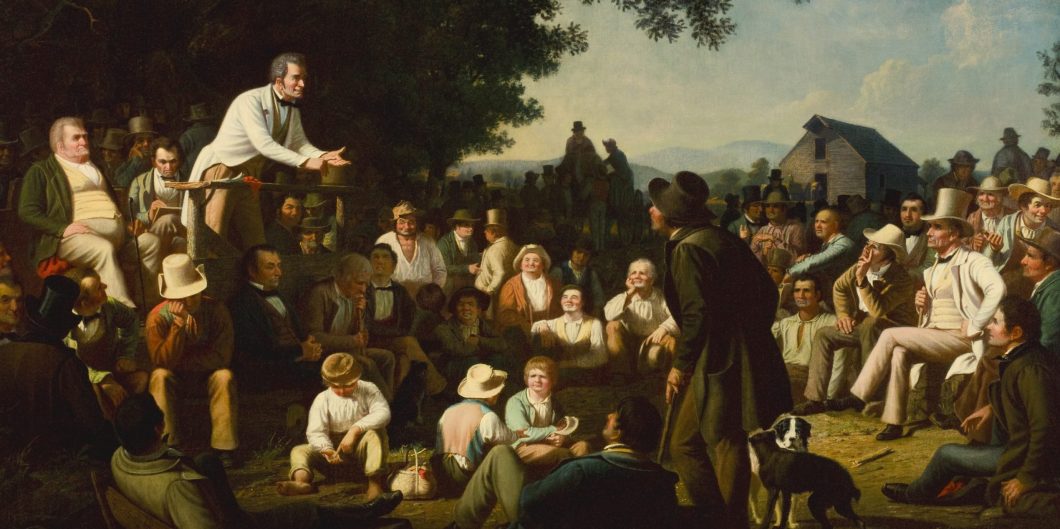Liberty and Our Political Order
Ronald Reagan, our most jovial modern president, famously quipped that “the person who agrees with you 80 percent of the time is a friend and an ally, not a 20 percent traitor.” His assessment could be supplemented with the observation that a person who agrees with you 100 percent of the time is either a liar or a fool. As I suggested in my initial essay, a basic premise of modern Western liberties is that persons reasoning in good faith will inevitably disagree about matters of ethical, political, or religious importance. With that standard in mind, I am grateful to the friends and allies who were generous enough to contribute to this forum.
Being neither liars nor fools, all the contributors raised valuable objections and challenges. Titus Techera presented the first set. Even if one accepts my account of our liberties, he asks, what do we do about the rise of a great power, China, that explicitly rejects them? And how can we sustain them against the internal threats of digital technology?
The former question is easier to address than the latter. My answer begins from the recognition that we are, once again, engaged in a rivalry between political entities that represent not merely different peoples, but different and often opposed cultures. Updating Samuel Huntington, the journalist Ari Roussinos has described this development as the rise of “civilization states”.
Engaging that rivalry requires not only strategic prudence, but also a renewed understanding and defense of the historical, cultural, and institutional sources of our way of life. On the one hand, that means opposing a naïve progressivism that treats the worldwide spread of personal freedom and peaceful cooperation as inevitable. On the other, it presents an alternative to a constrained nationalism that pits the United States against our continental neighbors as well as traditional allies. In seeking this middle course, I suspect that we find that the “idea of the West” has not yet lost its value. Although my essay did not consider geopolitics explicitly, I think it can serve as part of that enterprise.
Techera’s second question is more difficult and overlaps with points raised by other contributors. Digital technology does not merely make it easier for commercial enterprises to shape our habits by giving us what we want before we know that we want it. It also encourages us to indulge in the cheap thrill of fake association. The communities to which we are drawn are increasingly based on insubstantial “likes” rather than genuinely shared tasks.
Greg Weiner notes the consequences of this tendency in politics. Rather than working together toward concrete goals, we treat politics as a platform for the expression of opinions likely to be popular within circles of the already like-minded. Liberated from the obligation to deliver persuasive arguments or tangible benefits to a skeptical audience, it is always tempting to intensify praise of allies and condemnation of rivals. The result is a misperception of what remain relatively placid conditions by historical standards as a battlefield of war and enmity.
I agree with Weiner that the best remedy for this danger is to give associations significant authority—and thus significant responsibility—for outcomes that their participants care about. To speak only of formal politics, this requires a sustained effort to rescue political parties from a century of misguided reforms that have undermined their ability to regulate and moderate political contestation. More than anything in the written constitution, mass parties were a genuine American innovation for dealing with the challenges of personal freedom on a large scale. Our ability to do so has been reduced by their eclipse.
Because I don’t think we ever had a “regime” in the classical sense, I’m somewhat less worried about losing it.
John McGinnis mostly shares Weiner’s analysis, but objects to my preference for simplicity in public policy. He points out that a political and institutional landscape defined by associational freedom and personal responsibility will be more complicated than one designed by a single authority. Shouldn’t we recognize this complexity as a feature rather than a bug?
Like the hapless Mr. Salter in Evelyn Waugh’s Scoop, I can only say “up to a point”. A society characterized by plural institutions that offer real benefits and make real demands will be more complicated than one planned along rational lines. Beyond a certain degree, however, that complexity may overwhelm the capacity of many citizens to process information and make deliberate choices. When that happens, they are more likely to accept the authority of anyone willing to decide for them.
I suggest that we should prioritize simplicity in order to prevent such abdication—and the bureaucratic bloat that it encourages. When it comes to healthcare, for example, studies suggest that even experts are unable to select wisely from a vast and baffling array of alternatives. McGinnis implies that the alternative to the so-called paradox of choice is one-size-fits-all. Although I am not an expert in this area, it seems to me that we have a long way to go to before that becomes the main risk. The goal should be to increase the ability of normal people to make meaningful decisions (which means decisions whose risks and benefits they can understand and predict) rather than simply to multiply choices.
It is possible, however, that I am missing the forest for the trees. Scott Yenor suggests that the United States is undergoing a regime change that render such concerns quaintly irrelevant. In addition to geopolitical, technological, and institutional challenges also mentioned by other contributors, he emphasizes the burgeoning alliance among “woke ideologues, Big Media, corporate capital, and the administrative state.”
If I did not share Yenor’s apprehensions to any extent, I would not be likely to publish in this website. Nevertheless, I find his depiction of America in eclipse too apocalyptic. I suspect the source of our difference derives from distinct attitudes toward the concept of the “regime.” Borrowed from ancient Greek political philosophy by Leo Strauss, the concept implies a greater degree of coherence and stability than increased appreciation for equal personhood and the vast extent of modern states permits. Indeed, I would venture to argue that the institutionalization of modern Western liberties make a “regime” in the Greek understanding impossible. On this issue of political theory, I consider Constant and Hegel better guides than Strauss.
Because I don’t think we ever had a regime in the classical sense, I’m somewhat less worried about losing it. Instead, I regard our present discontents as the latest in a series of disagreements that go back to the establishment of the United States (to speak only of this country). Although it is easy to imagine that Americans enjoyed a placid consensus until approximately 1960, American history has been characterized by repeated and often violent conflicts about the limits of government, the requirements of citizenship, and even the nature of humanity. The view that today’s divisions are unique in their depth and intensity strikes me more closely connected with rhetoric-heightening qualities of digital politics than serious historical comparison.
And ancient societies were subject to their own contradictions. Helen Dale notes that Roman law is all about tensions between liberty, civic, and familial authority. Despite the long eclipse of Roman law, particularly in English-speaking jurisdictions, the tensions look surprisingly familiar. She suggests that “the rise of the modern corporation, its managerial class, and discretionary private governance has revived debate over issues that look a lot like the old debates over familia: who belongs to it; what do they give up of their personal autonomy to be a member; what rights and duties do they have; under what circumstances can they be thrown out?”
I don’t know the old answers to these questions, but Dale’s account made me want to study more Roman law—an outcome that is, as she admits when describing her experience as a teacher, no easy feat. The Romans remind us that, since not everything valuable is liberty, liberty is not everything. In that respect, we moderns still have lessons to learn.


